- Home
- Cherie Priest
The Inexplicables (Clockwork Century) Page 6
The Inexplicables (Clockwork Century) Read online
Page 6
But dead things walked in his head, too.
At the far reaches of Rector’s vision, the flickering, twitching shade of Zeke Wilkes gave a disapproving shake of its head.
You promised. I won’t wait much longer, Wreck. I’ll come for you, if you don’t come for me.
“You come for me all the damn time anyway.”
Outside the air was scratchy and dense. He’d known that already, but had forgotten it in the short time he’d been beneath the streets. He shuddered and climbed up to the last stair, and with all the patience he could muster, he drew the doors back down behind himself until they clicked into place.
Now. Where was he?
An alley.
Navigating half by touch and half by squinting through the thickened air, he struggled to the left … where he encountered a fence, so he turned around to try the other way out of the alley. Hugging the building’s exterior wall, he crept to its edge.
A corner. Excellent.
The steady patter of dripping water sounded nearby, and someplace not too far away he heard a building settle on its foundations, creaking and moaning. No other sound broke the spell. No footsteps. No shuffling. Nothing to indicate that he wasn’t alone …
For one brief, alarming instant he second-guessed whether or not people survived inside at all, Doornails or Station men or anyone else.
He dropped to his hands and knees. The sidewalk was smooth and cold under his probing fingers, but he investigated every stone, every gravel- and dirt-littered brick until he found what he was looking for.
There, a few feet out. An engraving. A name.
Commercial.
And now he finally knew where he was.
Six
Rector was on Commercial Street, the street which had once run closest to the Sound and the piers. Now it ran closest to the wall, and parallel to it, all along the western edge.
Rising to his feet, he fought to find his bearings. The street ran north and south, but where had he emerged? The air was clumped and uncertain, and he was surrounded by tall shadows. He had no idea where the wall was.
But he remembered now: North went uphill. South ran downhill.
“Psst!”
Rector froze.
He swiveled his head, compensating for his reduced vision in the mask, looking from corner to corner and up above the street. He saw nothing. Only the fog, and straight lines where buildings punctured briefly through it.
“Psst! Hey, you!”
Rector unfroze and flung himself into the nearest alley. It wasn’t his imagination. It wasn’t a ghost. In his experience, ghosts never made spitty noises and called him “Hey you!” The ghosts all knew his name.
“Go away!” he fiercely whispered back—hoping he projected more menace than fright.
“Who are you? What are you doing here?” asked the unseen person.
It was hard to tell with such an echo bouncing off the Seattle wall and all its encompassed buildings, but Rector was pretty sure the voice came from a nearby rooftop.
The hidden speaker asked again, “Who are you?”
“None of your goddamn business!” Rector replied more loudly than he meant to.
The silence that followed was stifling. It pressed up against his mask and pushed against his eardrums as the whole block listened to see what damage had been done. Had anything heard him? Was anything coming?
“Don’t holler like that,” the distant voice responded. The words were soft, lobbed with just enough of an edge to penetrate the space between them. This was the voice of someone accustomed to speaking where speaking was dangerous.
Any sound too sharp and the floodgates would open—Rector knew that much; he’d heard all about it. But there he’d gone, babbling regardless. “Sorry,” he muttered. “Go away, would you?”
Above Rector and somewhere to the right he heard the scraping push of feet. Someone scrambled, and the footsteps stopped, then came again—this time sounding against metal. The speaker was descending a ladder. Coming closer.
“Stay. Away. From me.” Rector leaned on the words, wanting them to sound deadly and figuring they probably didn’t.
“No,” came the response.
“Why?”
“Because you’ll die down here, running around like an idiot. Can’t imagine how you’ve lived this long. Let me help you.”
“I don’t want any help!” Again, the words were too hard. They scratched against the relative quiet of dripping water, creaking steel, and the patter of a single set of feet.
Getting closer. A lot closer. And definitely not a ghost.
Panic crept up Rector’s spine, gripped his neck, and warmed the back of his head. “I’ve got to get out of here,” he said to himself.
The other guy heard him anyway. “Not a bad idea. Come with me.”
“Like hell,” Rector said, and he started to run.
Three steps into that retreat, he collided with the corner of a building, bounced off, and caught himself just before falling down. His gas mask slid—not far enough to let in any of the toxic air, but one of his lenses had cracked, rendering his left eye’s view a mosaic of confusion. It was hard enough to see when everything was clear, including his head. Now he was half-blind in one eye, his ears were ringing, and he felt a warm, wet trickle of blood dripping down behind his ear.
He pulled himself together, picked a different direction, and ran that way. He bolted around the offending corner, tore to the right, stumbled on the uneven paving stones, and recovered. Then he ran forward some more, faster, up the hill … because that was the correct direction, wasn’t it?
“Oh for Pete’s sake,” complained the voice behind him. The voice was still coming, moving on feet that were very light and very fast in comparison to Rector’s.
He ran on anyway. The blood from his ear soaked the top of his collar and made the leather of his mask feel pulpy where the straps rubbed against the sore spot, but he ignored it. He also ignored the shuffling sounds that reached him over the pounding gong of his own heartbeat and the frantic skips and jumps of his hole-pocked shoes against the street.
He spied some stairs from the corner of his eye, swiveled on his heel, and climbed them, not knowing where they went and not caring much. All he had to do was get out of the other fellow’s line of sight, far enough away to hunker down and hide.
One of the stairs cracked beneath his foot and gobbled him up to his shin. He pulled his leg out by his knee, tugging with his hands to extract the boot and keep on climbing.
He wondered briefly why these stairs were on the outside of a building, then noticed, when the fog parted enough to let him notice anything, that these were interior stairs after all. The building had fallen away, leaving its insides exposed. Flight by flight, he passed big stretches of shattered flooring eaten up by holes. He huffed and puffed upward while hugging the rail, which rattled in his hand and surely wouldn’t hold him if he were to fall. It barely gave him balance enough to keep upright.
The Seattle city wall loomed up to his left, and that didn’t seem correct. He’d gotten turned around somehow.
Didn’t matter. Kept running. Heard nothing behind him, but the quiet might’ve been an illusion brought on by his stuffy ears. He wondered when it’d be safe to stop, and then he wondered what he’d do if he reached the top and there was nowhere left to go.
He didn’t wonder long.
The stairs ran out.
Rector teetered at the edge. He shook his head, trying to let the blood run out of his injured ear. It didn’t work, just made the pumping of his heart throb louder behind his eyes. But he didn’t hear anyone coming up behind him, so maybe this would be a safe place to stop. To catch his breath. To wait until his pursuer had gotten bored and wandered off.
His breathing was muffled and ragged inside his mask, but in time it slowed. He balanced there, not looking down and not looking back, waiting to hear that voice call out again.
It didn’t.
And after a good
five minutes, he took as deep a breath as he dared—there above some precipice on the other side of that last lonely step, the bottom of which he couldn’t even see—and he began a slow, quivering retreat back the way he’d come.
Funny. He hadn’t noticed on his frantic way up how fragile the steps felt beneath his boots. The wobble wasn’t his imagination. They creaked, too. He leaned toward the rail, and to the bit of wall that remained on that side.
Don’t die yet. You ain’t allowed.
“Shut your mouth, Zeke.”
One hand on the splintered, rickety rail, he breathed real slow and kept his eyes on his feet. One in front of the other. One step at a time.
He stopped.
What was that noise? Had the stranger caught up to him? He held still and listened.
Sounded like breathing. Low, wet, and not very healthy. Coming from something pretty big. But he didn’t see anything. The air was too dense; it moved like smoke in front of his lenses, one broken and one still clear.
Someone sighed.
Or something sighed. The gas-poisoned atmosphere whispered and complained, and once again Rector choked on a big gob of fear. It swelled until he could hardly swallow, and his heart caught up with a fluttering skip.
The breathing behind him—yes, behind him … and not his own—grew louder. Closer. So close he imagined he could feel it, warm and dank, against the back of his neck.
Stumbling now, he picked up his pace. He could fall, he thought. He could tumble and roll, and that would be faster, in a way. It’d hurt, and it’d be loud, but it’d be quick. A quick way to reach the bottom. A quick way to die. Wouldn’t it? His ankle turned, almost sprained. But didn’t. The joint kept locking, unlocking, with each stair.
A throaty groan shocked him with its nearness. He spun around, flailing, expecting to hit someone square in the face, but no. There was no one behind him, no one beside him—there couldn’t be. To one side was a drop-off leading nowhere; to the other, a lone wall—a final surviving shred of the old building.
Another groan, more harsh this time and, if at all possible, closer still.
“It doesn’t make sense,” Rector squeaked. He saw no one and nothing, heard only the breathing, the moan that came with an edge like gargling.
He ran, tripping over himself and the uneven, unstable stairs. Behind him they crumbled away; he heard them clatter, bounce, and break on their way to the ground. And he heard something else, too: a bang so loud that at first he didn’t realize it was a footstep. Not until a second bang followed behind it, then a third and a fourth, did Rector recognize the rhythm of something stomping behind him.
Not someone. Not this time.
For one ridiculous moment he wondered what’d become of the other guy, the one who’d come after him first. Where was he? Maybe he was evil, and maybe he was a murderer, but he’d been human—Rector was sure of that much. And whatever was behind him, this unseen foe, this was not a man. Men didn’t move so heavily, dropping from foot to foot with the weight of a horse. Men didn’t have such strides, longer than a half flight of stairs. Longer than …
A crash shattered the old building wall and ripped the rail out of the boy’s hands. He gasped and staggered, falling forward and catching himself. But the catch didn’t hold, and he slipped down farther, tumbling less gracefully than he might have if he’d gone down on purpose—but descending all the same, and face-first. On the way down, he whacked his chin on a step and knew it would mean more bleeding, but he couldn’t worry about that right now.
He scrambled on his hands and knees, ducking almost by accident, but his timing was good. As his head went down and his knees went out from under him, an enormous shadow leapfrogged him in a flash of terrible motion.
Through his one good lens Rector saw a shape that had two arms and two legs, but was in no way human. He watched it sail overhead, a lunging hop thrusting the huge, heavy thing from one turn of the stairs to the one below it, shattering the place where it landed.
It bellowed, and Rector’s heart nearly stopped. He still couldn’t see it well, not through the gum-thick air, but there it was, only a few feet in front of him. All he could make out was a person-shaped monster that couldn’t have been a person. No person was so huge, and no person had a face shaped like that, flattened and burnished like the leather on a rich man’s chair. The shape shimmered—or, no, it didn’t. It wasn’t an illusion, not a trick of the air or the dim, runny light. The shadow was just covered in hair.
“Not a rotter,” the damp, horrified boy muttered to himself. “Something else. Oh God, oh God. Something else!” His voice pitched up at the end, and he wanted to run. But he couldn’t go back up; there was nothing left but the sky. Couldn’t go down, because he’d never make it past … whatever that was.
The creature rallied itself and sprang.
Rector squealed, and with all the instinct of the not-quite-suicidal, he dove out of the thing’s way. Straight off the side and into the mystery below. He closed his eyes and waited for the end, wondering which breath would be his last, hoping it came quick, and it wasn’t so bad that he’d remember it on the other side. Hoping he didn’t stick around as a rotter.
The ground caught him.
It met him with a whump that stunned him, knocking out what was left of his breath. The fall hadn’t been far at all, and he almost felt cheated by the need to keep running.
Rector dragged himself to his feet, shaking all the way, and spun left and right.
He’d dropped only a flight or two, and landed in the mulchy, decaying rubble of the collapsed building, its floors having pancaked years before and gone soft with time and humidity. There were worse places he could’ve hit, but at that moment, he had a hard time thinking of any.
He crawled off the rubble and rolled out into the street. He knew good and well he’d made too much noise, but what could he do? The thing behind him, up on the stairs, was making more noise still, so Rector hoped that any nearby rotters would seek out the bigger, more vocal meal.
Once more, with bleeding head, scraped hands, and battered knees, he shoved one foot in front of the other on the uphill slope.
“Hey!” The voice was an outright shout this time, no longer keeping low.
Rector responded, “Not you again!” even though it was a lie, and he could’ve cried with relief just to hear another human being.
“What was that?”
“I don’t know!” Rector called back, his voice creeping back toward hysterical territory.
“This way!”
“Which way?” He still couldn’t see, didn’t know where he was, and had nothing to go on except the idea that uphill was where he wanted to be. But a rustling and roaring from the wreckage of the fallen building told him he needed to pick a direction and commit to it.
Maybe one of the alleys. Maybe if he could get off the main avenues and onto the side streets, he could lose the monster that way. He bolted to the right, zigzagging up and around, then back onto another narrow street with mushy wood sidewalks. He left the walkway shortly after setting foot on it—too squishy; slowed him down—and instead he went for the middle of the road and ran up the center as fast as his bruised legs could carry him.
“No!” hollered his invisible advisor. “Not that way! You’re headed right for—”
Rector didn’t hear the last part of that sentence. All he heard was the rush of air and the gasp in his throat as he flew into open space for the second time in the span of five minutes. The world crunched and shook, and he could hear the fizzling stars that swam in front of his eyes.
The white-hot sparkles swarmed, popped, and faded. He thought he might be able to see now, so he opened his eyes. Or he tried, then realized that they were already open.
Standing above him was someone just a bit smaller than him. Chinese, he thought—something about the shape of the eyes behind the other guy’s visor. And about Rector’s own age. But that couldn’t be right, could it? Everybody knew that Seattle was no pla
ce for women or children, or even grown men who’d very recently passed the ripe old age of eighteen.
But here was a living counterexample, shaking his head. Behind him, a ponytail swayed, dusting the tops of his shoulders. It was Rector’s turn to ask “Who are you?” but the words wouldn’t come. His mouth wouldn’t work. The outline of the other boy faded until it was something cut from a coal black shadow, backlit as he was by the mouth of something wide and white—the curved edge of the street above.
A hole. He’d fallen through a huge chuckhole in the middle of the goddamn street, Rector thought as the stars came back and everything went away except for Zeke.
Zeke, who was just saying Well done, dummy, when Rector passed out.
Seven
Rector dreamed, or maybe he didn’t.
He heard Zeke a time or two, saying his name. But Rector was tired of talking to ghosts, so he didn’t answer, even when Zeke was demanding, and even when he sounded worried. To hell with Zeke and his worries. Rector was dying, anyway; they could hang out and be ghosts together, and wouldn’t that be a kick in the pants? No good deed goes unpunished, or so he thought sourly as he tossed and turned and tried to tell the difference between asleep and awake, alive and dead.
He was lying on something firm, but possibly intended to be comfortable. Maybe this meant he wasn’t dead; but the room felt very small and close, as if he were resting in a coffin. Then his thoughts circled around to the conviction that nobody would pay for a coffin to bury his sorry corpse—and, anyway, dead people couldn’t possibly hurt this much, unless they were in hell. He was pretty sure of that. Read it in the Good Book once.
And with every ounce of his aching body, his rattled consciousness, his uncertain sanity … he wanted sap. He imagined he could smell it nearby—the tang of its cooking, the sharp whiff of the terrible yellow substance curling into smoke on a sheet of tin.
So he asked for some, on the off chance that anyone was listening … and, if so, that they’d be willing to share.
No one gave him any. But sometimes people talked to him.

 Maplecroft
Maplecroft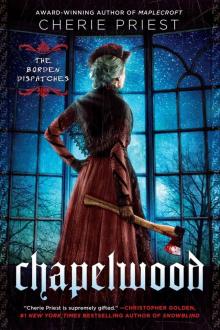 Chapelwood
Chapelwood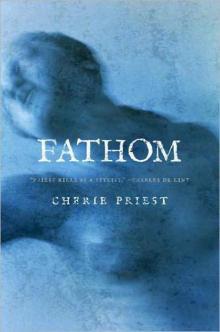 Fathom
Fathom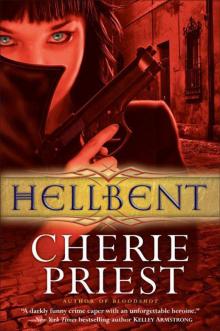 Hellbent
Hellbent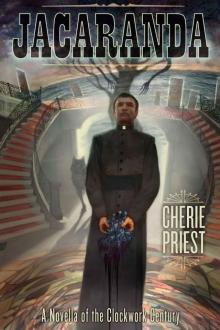 Jacaranda
Jacaranda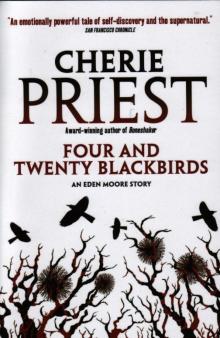 Four and Twenty Blackbirds
Four and Twenty Blackbirds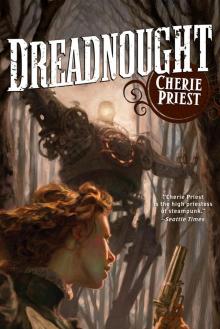 Dreadnought
Dreadnought Dreadful Skin
Dreadful Skin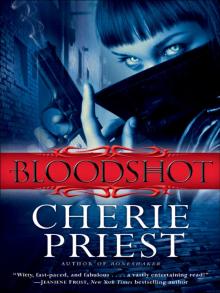 Bloodshot
Bloodshot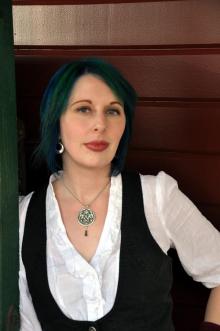 Tanglefoot
Tanglefoot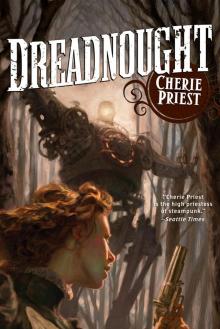 Clementine
Clementine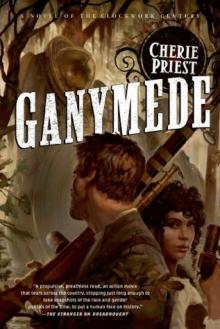 Ganymede
Ganymede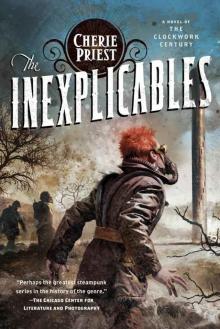 The Inexplicables
The Inexplicables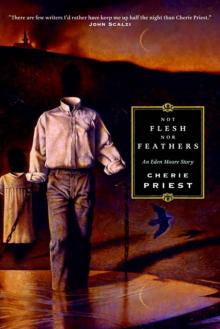 Not Flesh Nor Feathers
Not Flesh Nor Feathers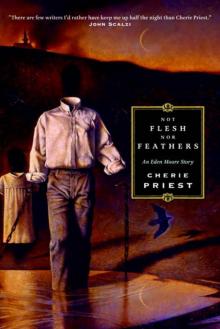 Wings to the Kingdom
Wings to the Kingdom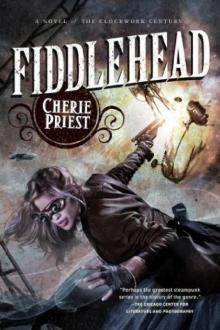 Fiddlehead
Fiddlehead Tanglefoot: A Story of the Clockwork Century
Tanglefoot: A Story of the Clockwork Century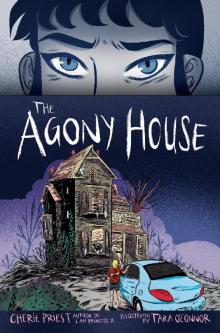 The Agony House
The Agony House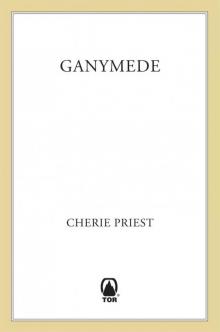 Ganymede (Clockwork Century)
Ganymede (Clockwork Century)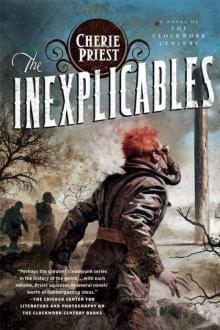 The Inexplicables (Clockwork Century)
The Inexplicables (Clockwork Century)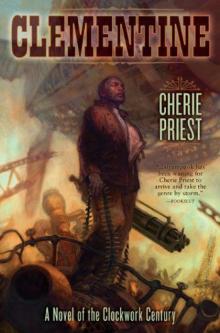 Clementine tcc-2
Clementine tcc-2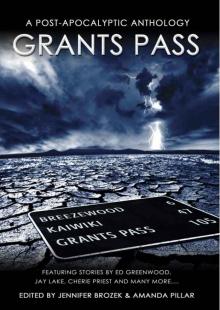 Grants Pass
Grants Pass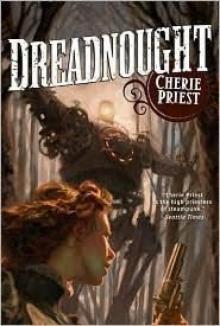 Dreadnought tcc-3
Dreadnought tcc-3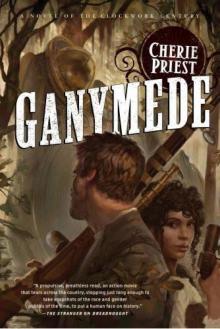 Ganymede tcc-4
Ganymede tcc-4